All change, please!
This post has been updated and is now on a new version of this site.
This notice will remain online until 20 September 2016.
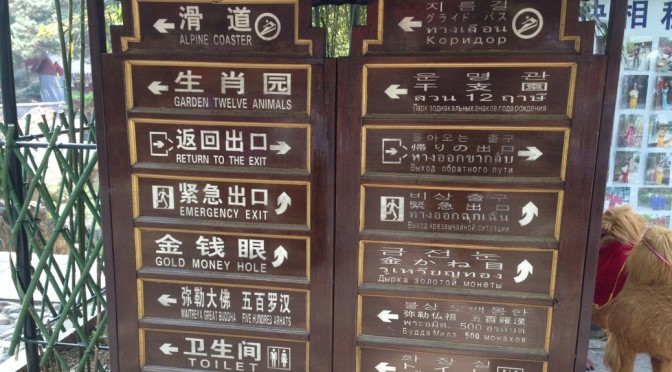
All change, please!
This post has been updated and is now on a new version of this site.
This notice will remain online until 20 September 2016.
The guys behind the “North Jing” (Beijing) are masters in particularly easy and remarkably cheap methods aimed at apparently solving problems. Want more people in the Subway and off the roads? Make Subway fares incredibly cheap. Still too many cars on the roads? Implement road rationing policies. Still still an excess of motorised wheels? Institute a cheap lottery system which is impossible to win for most of us. Still still still too many cars? Decrease the plates available for the lottery and reintroduce the “odd / even plate” rule on (unpredictable) Bad Air days. Oh and also increase penalties for those caught resisting the rules.
An excess of Chinglish in the city? Get some retired academics with limited overseas experience into a makeshift “experts committee” instead of — what can I say — qualified people. (For rail English, I have one as well — but these are award-winning professionals and seasoned travellers in the group instead of people who slipped in “through the back door”.) Make them translate a 50+ page book they wanted to do about “proper English for locals” from standardised English into Chinglish. (I’ve the copies on my hard drive: after submitting the ones I improved and put a lot of effort into, the “revised” ones by a Chinese professor who must have had just limited experience overseas were so “Chinglishified”, I ended up staring at a wall, thinking if my head should head there (pardon the pun) because of this shock of total, utter disbelief.) Oh, and in case you thought Stop Mouth at this train station with service to “Xuzhoudong” (Xuzhou East, but with the cardinal direction illegally using pinyin) station were anything out of the ordinary — well, let me tell you this: City authorities are floating the idea of lowering the total score for English on standardised university entrance exams, so they will in future weigh less. That’ll be 100 points instead of the 150 points. The sad practice of bored academic sermons, sadly, will see no changes.
City Hall is thus saying: To solve the city’s Chinglish problems and to “make English easier”, we are downgrading its importance. Guess what: that’s a mere formality. Still part of the exams will be — I swear — questions where locals see only one correct answer, but where two correct answers will be comprehended by native speakers of English from Europe and North America. I swear, this will be utter hell to all students. Downgrading English doesn’t solve the problem: it merely aggravates it. You will still be stuck with the average local unable to respond to your simplest-of-all-demands in English. You will still be stuck with bilingual essays that earn an A+ in Chinese — and merely, at best, probably a C in English. Oh, and not to mention the massive plagiarism in the academic world. How do you identify a paper from mainland China? Chinglish throughout, terrible grammar, and a way of thinking that just befuddles the average overseas academic. Is that what you want — or want to keep?… and I ask that to city authorities both before and after the points downgrade. Can you swear in the name of God Marx that you can totally annihilate, say, Chinglish, by downgrading the importance of English in the university entrance exams? (I really can’t see how that could work.)
Always willing to listen to a second opinion, I put this question forward to my class: Do you think we should downgrade English? Nearly all students sounded a clear NO — some were outright furious at the idea. It seems the new trend in China is to “throw up” on problems instead of solving it. HSR train crash (July 2011)? Downgrade new lines from 350 km/h to 250 km/h. Worsening smog? Force people through ridiculous lotteries just to get a car. Chinglish conquering Beijing? Downgrade the importance of (proper) English.
I’m pretty sure that, some years down the road (when “more competent” people with a fully functioning brain take over), we’ll take a second look at history — and regard that those who have run our failure of a capital in these years (at present) the same way as we looked at George W. Bush when he left office.
It’s late November. I like these late November days. First, the temps indoors are going up — we humans love places where the temps are just right — everyone should have those nice feelings of going into places where it’s nice and warm… and second, people are just calmer overall. 40+°C temperatures over summer means we will see (and have seen!) a few folks lose their calm — I took the train to Jilin once, and I saw passengers up in Second Class totally lose it as a few passengers from northeast China wrestled one another because someone was sitting in another guy’s assigned seat — or someone’s bag was probably an inch too long!
Talk about things to lose your calm over…
These past days have been filled with action on my end. I’m on the road again after one of the worst colds on record — for two weeks in late October and early November, I was out with a 40°C fever and a terrible throat that made me lose my voice for about two full days. In just four days, I completed trips to Xuzhou, Shanghai, Hangzhou and Wuxi, met station crew from Xuzhou and Wuxi, and became honorary speaker and English consultant for stations in and around Xuzhou — so if you see Chinglish there, don’t yell at the railways — yell at me instead!
The city of Beijing has been having more blue sky days as of late. In fact, if you’re armed with a car, it’s one of the best seasons to be in and around the Jing. Your best photo shots come out from days right after the cold, northernly winds “greet” the city, where you’ll get at least one or two days of blue skies without feeling like it’s Siberia (with only chillier wind giving you a hard time).
I’ve taken some good shots of the Jing in past years, but these days, my “mobile machines” are trains, not cars. I’m thinking of Zhengzhou for Friday — another round of railway Chinglish extermination, as usual. To me, the title “Honorary Speaker and English Consultant” for Xuzhou means only one thing, really:
“Doctor Chinglish Exterminator David Feng”.
All change, please!
This post has been updated and is now on a new version of this site.
This notice will remain online until 20 September 2016.
That’s because I started helping my school clean test-tubes and beakers when I was about 15 over lunch — when I had nothing better to do after finishing my quick helping.
I’m not kidding you. It might seem a helluva strange reason: how do you mix cleaning lab gear with optimising English? But that’s the thing: it’s all about helping out and not “asking for attention”. (My friends in China tell me that this was the thing that was done half a decade ago. These days, if you help out, you’d be seen like an outdated follower of Lei Feng (“the mythical Chinese guy that helped everyone”) if you didn’t leave your name on the thing.)
Like: As of late, one of the trains that’s used my optimised English, train D365 from Beijing South to Fuzhou, got commended by the official People’s Railway Daily. But you never saw any public mentioning that “it was David Feng’s idea to equip the train with bilingual service cards, and that David had to work and retweak the cards, time and again, to get it right, and that David Feng paid from his own pocket to get the cards made ‘for real’, because he wanted the thing on the train ASAP”.
I seriously couldn’t care more. The thing is, I’m helping out because of Chinglish on the trains. Honestly, when you’re told — Please don’t throw the rubbish into the dustbin — you know that something’s gone wrong. Where else can you dump that banana you’ve just devoured? Obviously, the windows are sealed; it’d be suicide to crack these things open at 380 km/h*.
So with China concocting more Chinglish than they’re eradicating it — the rails included — it’s about high time I stepped in to stop the mess. Regard me as the lingo-savvy street cleaner, always photographing Chinglish and always correcting it. For one thing, I don’t like it when my railways scream out with Chinglish on their back. (If you bang into me you’ll see I’m Chinese, irregardless which ID I hold. And I don’t like it when Chinese Railways has to make do with sub-par Chinglish.)
Wuxi East is a cool station, and they’re probably a little cooler with standardised, optimised English all over the place. But nobody’d knew they translations were David Feng works — I deliberately left all traces of David Feng-ness off the thing. Ditto with Xi’an North — if you spot optimised English, that’ll just me doing my thing, sans credits. Oh and the same with Hanzhong and Ji’nan West.
I’m helping the rails get their English in order. (As an assistant professor of English at a key uni in China, it’s about time I did something for real — combining what I teach with what I love.) I’ve been to 22 countries and territories and I know when they’ve right-glish hanging over you in station signs. Obviously, since this is China’s railway system, I’m basing my optimised English on Chinese national norms, but I’m also making an effort to get the English up to speed by consulting with how English is used the right way in Hong Kong, Taiwan, Switzerland, and the UK. (Forget the US — they dumped the rails a long time ago…)
I don’t expect to get paid for this; I’m also not after free rides. (I paid for 34,000+ km of rail travel last year.) It’s a bit of Menschness (a la Guy Kawasaki). I’ll be happy when I slip into bed in the evenings knowing that Chinese Railways have one less sign in Chinglish, and one more sign in optimised English.
For one thing, I’m already happy now that passengers on HSR services to Shijiazhuang are no longer told: “Please don’t throw the rubbish into the dustbin”.
That for one thing sure keeps the rails cleaner!
* Soon. (I’m optimistic.)
There. I let my emotions loose. Never mind I’ve my mixed opinions on if we should call 北京南站 either Beijing South (correct) or Beijingnan (pinyin works). But I’ve seen a few of the sickest Chinglish at China’s train stations.
China’s trains are the best on the planet. The CRH380AL, which shuttles riders all the way between Beijing and Guangdong, is the fastest train on the world when it comes to train sets in actual commercial operation this very present day. So why should a First Class HSR system make do with Second Class Chinglish?
I’ve collected a few of the crassest mistakes. I’m now on a mission to knock out all Chinglish at China’s train stations faster than the CRH380AL speed machine. Think of this as my social duty as a teacher of English and media in universities around China (Communication University, Chinese Academy of Social Sciences (Graduate School) and soon, Hebei University, if the plans work out well).
I don’t charge the rails a single half penny for this. We’ve got to give back to society once in a while. I’ve enough in the piggy bank to keep the batteries up for a fair bit of time. In the meantime, it’s time to be a lingo Mensch, as Guy Kawasaki’d say so…
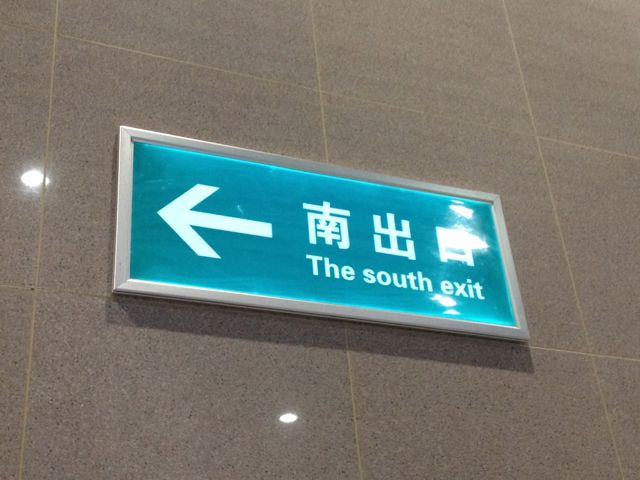
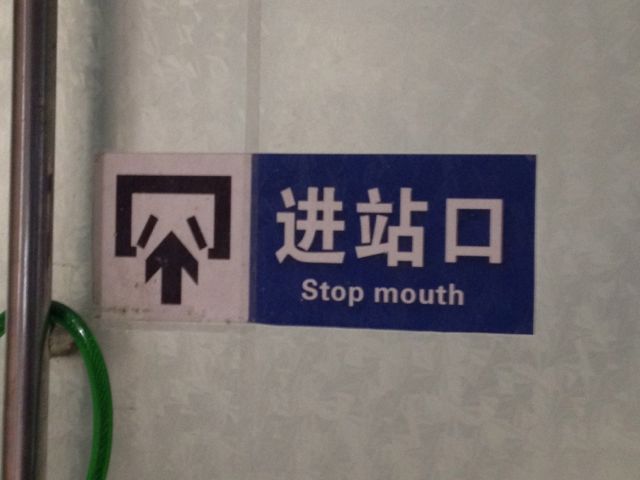
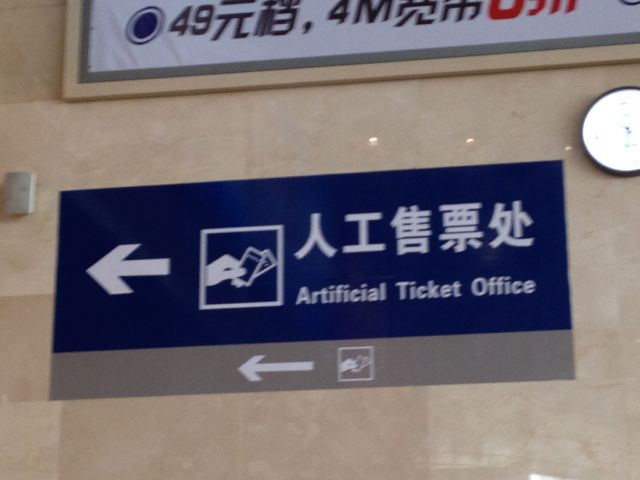

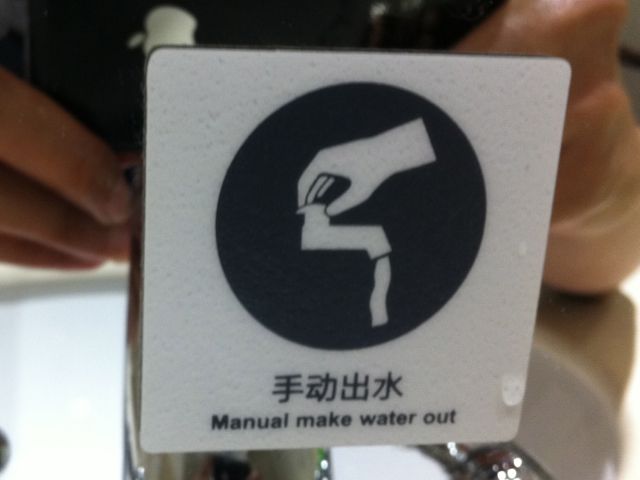
Finally, on the trains, the taps themselves come with Chinglish pre-installed…
Worse: DON’T CALL ME “DOCTOR FENG!”… I have not yet been “christened” a “Doctor” since I have still got to get my final dissertation done right… a la KFC (“We do chicken right!” and stuff like that)…
DON’T CALL ME “TEACHER”, EITHER! In China, every last soul calls a teacher — well, “teacher” (老師). That don’t work out fine for your David here. He prefers folks to straight-out address him as David. Buck naked, we are all the same: we can all eat, drink, go to the toilet and take time off in bed. We’re the same be our skins black, white or yellow. So I don’t for a split second buy the fact that “a teacher is ‘superior’ to a student”. I don’t buy it.
I look up very well to the Western world, where you call a teacher by his family name, plus “Mr” or “Ms”. I look up even better to the world of “personal communications” (so to speak in jargon-ese), where David Feng is just simply “David”. Hence my preference for my students to outright call me David. I don’t want for a second to be referred to as Doctor Feng. It just confines me to that Ivory Tower I never wanted to be in at all. It’s un-Mensch, as Guy Kawasaki might say. A Mensch of a teacher realizes he’s an equal amongst all the other students.
I sure hope my fellow students can nick away some knowledge he or she will put to use one of these days, but I hope even more that chez my lessons, students and teachers can act as equals. In this long stroll in the Edu Trail, it’s much better if the head of the team doesn’t put off airs and acts more like a guy in the midst of a group than an absolute dictator leading it. That’s just my way of doing lessons: I don’t do titles, I do outright human language…
All change, please!
This post has been updated and is now on a new version of this site.
This notice will remain online until 20 September 2016.